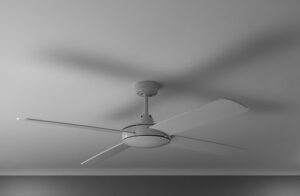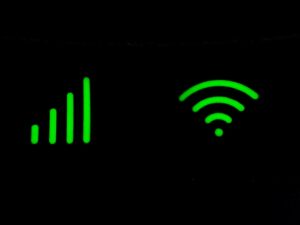A strong WiFi connection is a current requirement, even more so in houses with numerous people who need to work, play, or be entertained. But, as you do so, you may find yourself in strange parts of kitchens, closets, or cellars where your WiFi does not extend.
The most effective technique to boost your WiFi signal is to upgrade from a dedicated line to a mesh network, but mesh networks may be costly. WiFi adapters are an alternative, albeit they may introduce interference and delay.
USB adapters easily add WiFi to a computer or upgrade an older laptop with failed WiFi. They’re typically reasonable; however, the price varies according to the bandwidth and range offered by each dongle.
Sit back and read through to find out more about the best WiFi adapters for you.
No products found.
WiFi 6 and its Role in Adapters
WiFi 6 guarantees faster speeds, more bandwidth, and less interruption for business and residential connections, but those claims are yet to manifest in real-world scenarios.
There is just one WiFi 6 USB stick on the marketplace: D-DWA-X1850. It supports the AX1800 revision of the WiFi 6 specification. Still, it doesn’t necessarily facilitate faster speeds than most 802.11ac devices.
Until 2020, all other connectors in production supported WiFi 5, or 802.11ac. While your machine is likely to support 802.11ac, you need to get an adaptor if it does not.
802.11ac is a significant upgrade over 802.11n and supports increased speeds without requiring larger antennas or adapters.
Why Should You Buy A WiFi Adapter?
If your PC includes built-in WiFi, most people will be content without purchasing an additional dongle. Still, the machine will seem slow and become old before the WiFi transmitter does in most cases.
However, for personal computers lacking built-in WiFi, a USB WiFi adapter installs and configures in seconds without the need for hand tools. It’s far more straightforward than adding an interior WiFi network card or stringing an Ethernet connection throughout your house.
As mentioned earlier, while USB WiFi adapters are primarily used on desktop computers, you can also deploy them to update an outdated laptop without any added hassles.
Additionally, there are a few instances where your laptop’s inbuilt antennas are burnt due to overload or broken. An external WiFi adaptor might help use a shaky connection in those cases.
A few things to Note Before Purchasing A WiFi Adapter
After doing an internet search for 802.11ac (also known as WiFi 5), it is clear that USB WiFi converters from big manufacturers often rank higher in online searches and buying sites. Still, we dug deep and relied on customer reviews to rate our top 6.
We quickly excluded adapters that only support 802.11n, as the technology is over a decade old.
Each adapter was chosen on the basis of:
- Output – There are times when you need to wait for a moment before your content loads right? That is because of insufficient bandwidth. You’ll need good bandwidth to download updates and stream content at the desired quality and avoid the loading time.
We began by examining each adapter’s AC rating. While these ratings are sometimes inaccurate, they indicate the adapter’s potential maximum power.
For instance, an AC1200 adapter is rated to deliver 350 Mbps (megabits per second) on the 2.4ghz and 865 Mbps on the 5ghz. However, no device can have advertised speeds.
- Bandwidth Range – A decent WiFi adapter should be capable of maintaining a good bandwidth and reasonable file transfer rates even when located between several obstructions.
- Cost – After reading several customer reviews, it is essential to note that the pricier adapters did not outperform the ones worth less. Consider the cost is critical—you should not be required to pay more than $40-$70 for a USB adapter.
Spending more does not always imply superior performance. If you’re paying extra, you may as well upgrade your standalone router or add an Ethernet port to your PC.
You could also establish a new network model in your residence by paying just $40 more than the base price of the most expensive adapter.
- Build Quality and Portability – Both of these features will help you get the most out of your WiFi dongle. While compact connectors are less likely to hook on wires or break loose if accidentally caught on your wrist, they often feature shorter transmitters and weaker radios.
- Warranty Period – All of the adapters we evaluated are covered by a minimum of a one-year guarantee, although two-year insurance is also standard.
- OS Compatibility – While all of the devices we tested functioned with Windows 10, we took note of those that claimed to support Ubuntu, mac, and prior Windows versions.
- Process of Setup- The majority, if not all, of these USB adapters, will automatically utilize Windows 10 to install and function with the necessary driver. We noted if there were any additional procedures required during the installation of the adapter.
Our Top 6 Picks for the Best WiFi Adapter
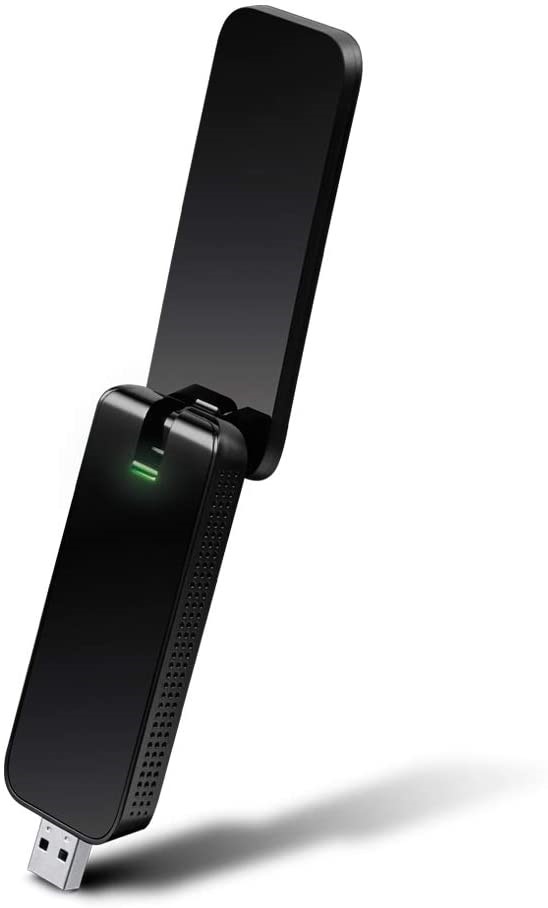
The Archer T4U is TP Link’s USB-attached AC1200 wifi adapter. It has an omnidirectional transmitter and a USB extender for signal optimization.
The Archer T4U includes all the expected features from a wifi adapter, along with a WPS switch on the dongle and a green-lit status LED.
The antenna is entirely internal, allowing for a more compact appearance than some other competitors.
The body of the Archer T4U is quite boxy and bulky, and the plastic feels less sturdy than that of its competitors.
It’s exceptionally glossy and polished, which makes it scratch-prone.
In usage, the Archer T4U has difficulty maintaining a stable connection on both the 2.4GHz and 5GHz bands.
It occasionally lacked responsiveness and suffered delays when accessing Web pages.
Pros
- Comes with AC1200, making it a fast adapter.
- Includes an LED light indicator for connectivity status.
- Includes a WPS button for quick connectivity.
Cons
- Lacks an RF shield.
- Connectivity issues over 5GHz band.
- inconsistent download and upload speeds.
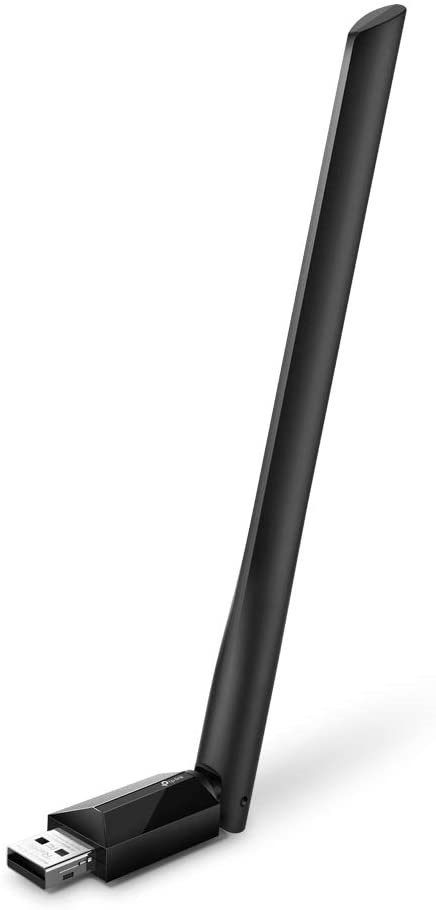
The TP-Link Archer T2U is a small USB WiFi adapter with an integrated 6-inch transmitter. You should consider it as your first choice if you want to save money and want a reliable wireless connection across your house.
It has an AC600 rating (200 Mbps on 2.4 GHz, 433 Mbps on 5 GHz)
The housing of the adapter is compact and light, although accommodation for the long antenna is required. Its articulated attachment with the adapter casing looks sturdy and well built.
The Archer T2U comes with a generous two-year guarantee and is compatible with macOS and Windows.
The TP-Link Archer T2U is an outstanding Wi-Fi adapter that offers quick connectivity and good wireless coverage. Its price is reasonable, and its qualities make it an excellent pick for the majority of individuals.
When you’re looking for a low-cost WiFi USB adaptor that delivers on performance, the TP-Link Archer T2U is an excellent choice.
Pros
- It can connect to both the 2.4GHz and 5GHz bands sans compromising bandwidth.
- It features a single 5dBi high output antenna that provides an exceptional range.
- The antenna may be positioned and turned in whatever direction you like.
Cons
- There is no suitable instructional video for installing on LINUX.
- No beta drivers included.
- There is no USB extension cord included.
- The surface is glossy and can get easily damaged.
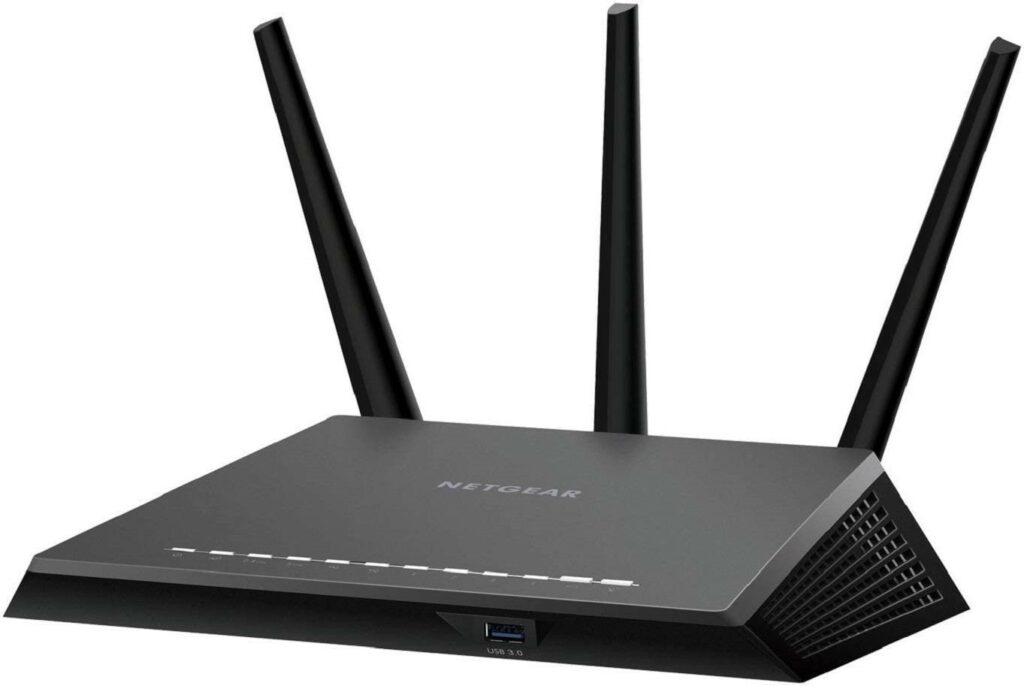
The Netgear Nighthawk is worth the investment if your usual schedule includes repeated massive file transfers or if you’re subscribing for an internet data plan with 100 Mbps or greater bandwidth.
The design is Netgear’s slickest offering. The Nighthawk is a horizontal adapter (although it can be mounted on a wall) and has a broad base that ensures its stability, even when cables are attached to each port.
The rubberized base prevents it from sliding or falling.
A massive router comes with huge specifications, and the Nighthawk delivers on its size and claims.
The Nighthawk is powered by a dual-core 1GHz CPU—a formidable processor for a retail adapter. The R7000 enables data transfer rates of up to 650Mbps on the 2.4GHz band and up to 1400Mbps on the 5GHz band.
Three external antennae are connected to the router’s rear panel. The R7000 also features 128MB flash storage and 256MB RAM.
There are two USB connectors on the router: USB 3.0 on the front and USB 2.0 on the backside.
The USB 3.0 connector was purposefully positioned on the front, away from the 2.4GHz transmitter, to avoid interference with Wi-Fi signals.
Both ports are compatible with USB integrated devices and peripherals.
Pros
- Consistent and stable speeds.
- Covers a long Range.
- Comes with ReadySHARE Vault.
- Fastest peak throughput in an adapter.
- Best in class USB network reliability.
- Stylish design.
- Front and back-mounted USB ports.
Cons
- USB 3.0 performance, not at par.
- Delayed firmware updates.
- Lesser range in comparison to other AC1900.
- The Asus offers a more straightforward interface to work with.
- Comes at a very premium price.
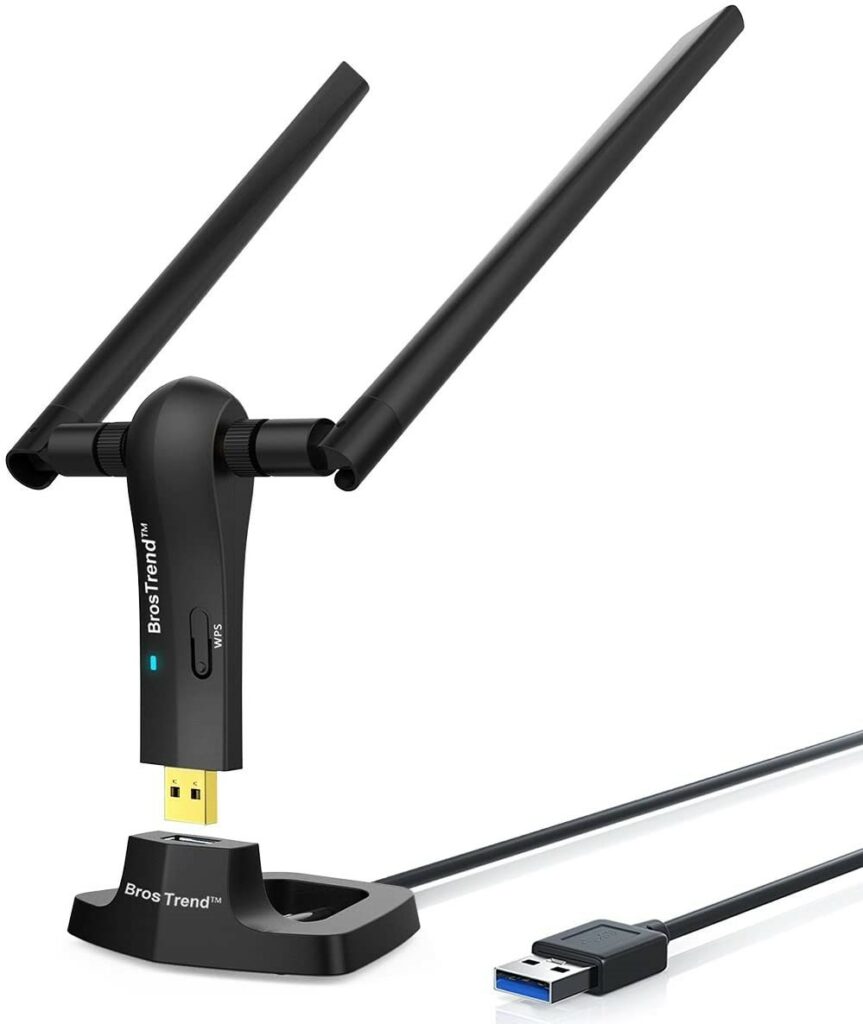
This off-brand adaptor is built cheaply and generically. It’s an AC1200 adapter with two antennas that you can rotate. You may either connect it straight to your computer or utilize the dock that comes with it.
On the other hand, the USB dongle does not wholly insert into its docking, keeping some of the connections exposed. The wire is meant to exit via a notch on the dock’s bottom, but it frequently pops out, causing the port to tilt.
The BrosTrend adaptor performed badly for a device with two giant antennas. It obtained a 5.5dBm stronger signal at 5GHz on average.
While the dock is not required to operate the adapter, this can be an excellent addition to increase speeds and reduce latency.
When you plug the adapter into a Windows pc, it will be instantly detected as it comes with a plug-and-play installation feature.
Pros
- With two 5dBi High GainWiFi Antennas included, this wifi Adapter provides extended wifi range and good signal strength on your workstation, desktop, or Laptop.
- It is equipped with a USB 3.0 port at least five times faster than USB 2.0, a gold-plated USB port for a more stable and secure Internet connection.
- Comes with an ethernet cable.
Cons
- No dedicated app for setup and modification.
- Inconsistent performance on the 5ghz band.
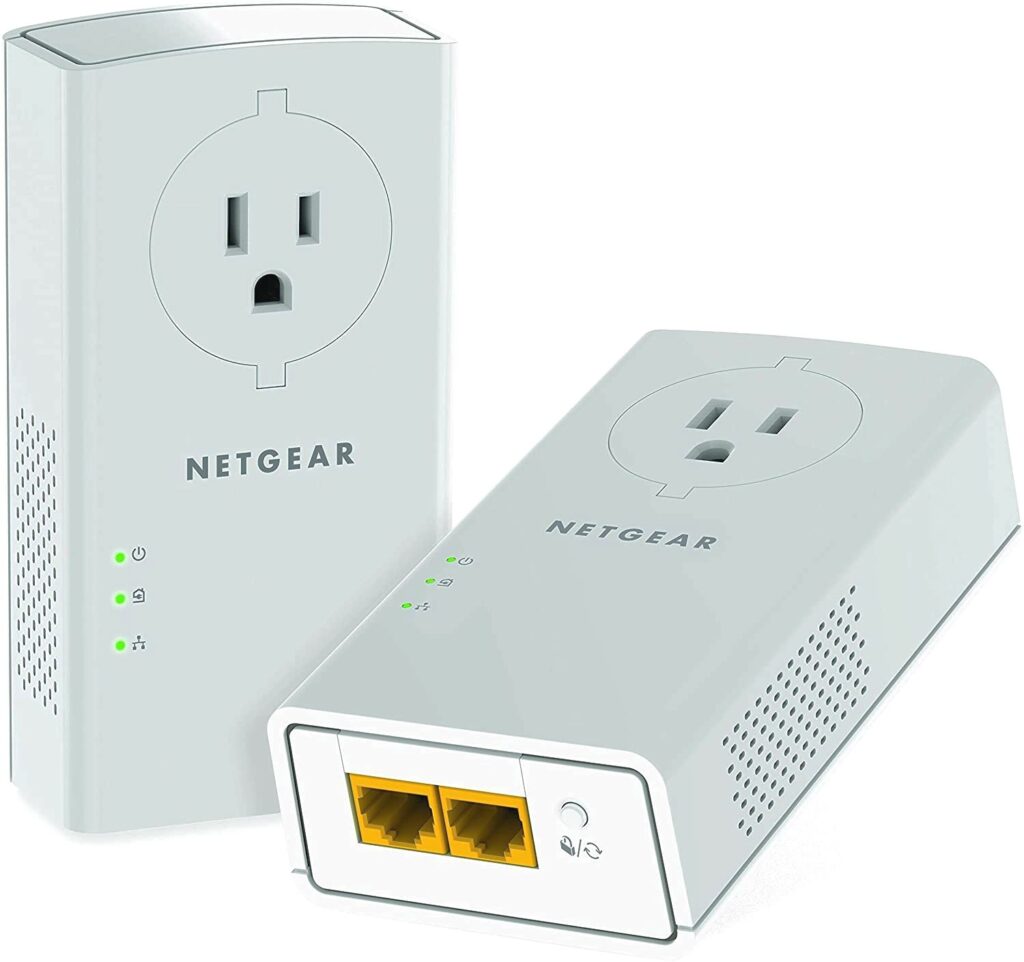
The Netgear Powerline Wi-Fi is a straightforward plug-and-play device that connects to your modem or router via your home’s electrical cabling.
The product comprises two adapters – a powerline converter that links to your modem or router and a secondary device that you can connect to any area of your house.
Each adapter features an Ethernet connector that you may use to link a modem/router on one side and a television or game system on another.
The Netgear Powerline is an excellent choice for resolving connection problems in your house, as it is simple to set up and delivers amazing results.
This adaptor features two antennas to boost signal strength, but it also essentially creates another wireless connection.
Additionally, customers may connect additional Netgear Powerline converters to expand their Internet access points.
You can also modify your network settings by changing the network’s domain name and password.
Pros
- Powerline utilizes your home’s electrical wiring, so no additional wires are required.
- Powerline Wi-Fi extenders are an excellent method to expand your Wi-Fi network, particularly to locations not directly connected to your router.
- Powerline adapters are impartial; they may be transported around and used with a wide range of devices without a problem.
- Powerline adapters are very easy to use, and you should have no difficulty configuring them. Connect, pair, and you’re done.
Cons
- They are only effective if both ends are connected to the same circuit.
- Electrical Disruption can affect them.
- Speeds are inconsistent.
- Not compatible with adapters from other manufacturers.
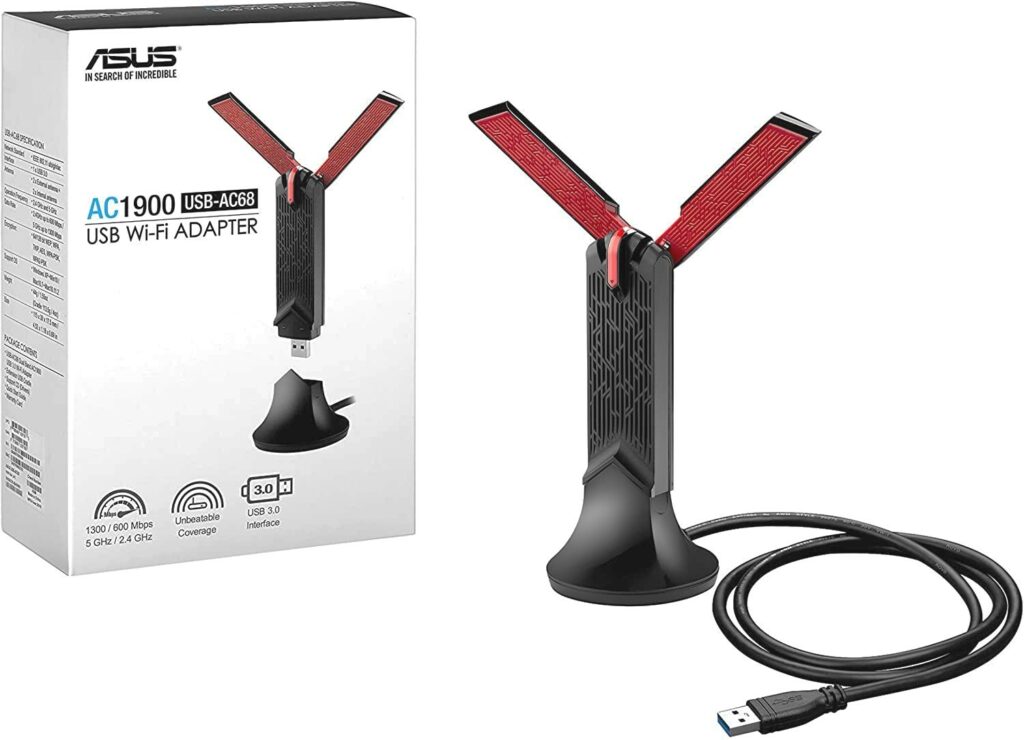
The Asus USB-AC68 adapter boasts a unique folding design with two deployable antennas. It supports both USB 3.0 and the AC1900 protocol.
This Asus adapter trails significantly in the 2.4GHz testing. While the 5GHz testing was decent, it was still not the quickest.
If you want to use your adapter for gaming while traveling, the Asus USB-AC68 is a much better alternative.
The converter comes with a cradle for use at home. It also comes with the option to be connected straight into a USB port for convenience when traveling. Additionally, the low list price of approximately $80 is reasonable for what it offers.
Pros
- Fast.
- Good range.
- Latency free.
- Offers a versatile build.
- Really cool design.
Cons
- Unreliable and inconsistent connection
- Expensive for what it offers
- Non-compatible with certain devices
FAQs Regarding The WiFi Adapters
- Are WiFi Adapters worth The Hype?
The most excellent WiFi adapters can give a barely different experience from that of your computer’s or laptop’s built-in WiFi module. However, those are often the bigger models, with several antennae and a hefty price tag.
The tiny nano connectors will function relatively poorly. They will almost certainly require a direct line of sight to your routers to get optimal speeds. However, they are more convenient if you need mobility with your adaptor.
- Are WiFi Adapters a Decent Choice For Gaming?
Whatever adaptor you select and how much money you’re prepared to invest is entirely up to you. The best-in-class WiFi adapters will give nearly indistinguishably performance compared to a built-in adapter for playing online games.
However, inexpensive and lighter models may result in more delays making them less appropriate for competitive gaming.
Conclusion
While it may appear as though there are several factors to consider when purchasing a WiFi adapter, it’s critical to remember that it all comes down to one thing. That is, to improve wireless capabilities for any PC, computer, or console.
Connecting to your router will almost always provide the best speed but a WiFi adapter will allow you to attain greater mobility within your house. It eliminates the need for Ethernet connections and additional cables, making it an excellent alternative.

